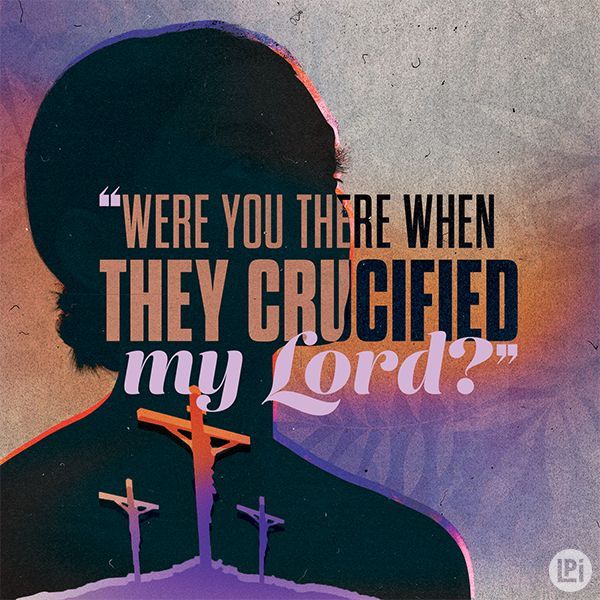The African American spiritual, “Were You There?” is deeply moving and widely used especially at this time in the liturgical year. We’ve heard it so often in churches over the years, but I fear that some (perhaps even me) have lost touch with the meaning behind this spiritual. We will participate venerating the cross during the Good Friday liturgy, but I fear that others (perhaps me included) may have fallen into the mechanics of the ritual without heartfully reflecting on the deeply piercing question from the song, “were you there?”
The question is posed in the second-person past tense, indicative mood. Most of us speak English without thinking about tense and mood, but in this case the distinction is important. The indicative mood is a verb form you use to make declarative statements that you assume to be factually accurate, such as when you ask a question in the form of a statement or state an opinion as if it were a fact. The question isn’t “Did you hear about this?” or “Did you read the headline?” or “Have you seen this story trending?” From a lyrical analysis standpoint, the author may have been asking the question in a literal sense, implying that the event should be remembered as if the listener had been physically present.
For us today, how can we be really present to an historical event that happened thousands of years before any of us were born? Isn’t the reading of the Passion in today’s Gospel merely a commemoration of that event? How does an event of the past have any bearing on my present circumstances or future trajectory?
The late Pope Benedict XVI gives us a clue. He writes:
“Jesus is nailed to the Cross. The shroud of Turin gives us an idea of the unbelievable cruelty of this procedure. Jesus does not drink the numbing gall offered to him: he deliberately takes upon himself all the pain of the Crucifixion. His whole body is racked; the words of the Psalm have come to pass: “But I am a worm and no man, scorned by men, rejected by the people” (Ps 22:7). “As one from whom men hide their faces, he was despised... surely he has borne our griefs and carried our sorrows” (Is 53:3f.). Let us halt before this image of pain, before the suffering Son of God. Let us look upon him at times of presumptuousness and pleasure, in order to learn to respect limits and to see the see the superficiality of all merely material goods. Let us look upon him at times of trial and tribulation, and realize that it is then that we are closest to God. Let us try to see his face in the people we might look down upon. As we stand before the condemned Lord, who did not use his power to come down from the Cross, but endured its suffering to the bitter end, another thought comes to mind. Ignatius of Antioch, (died circa 120 A.D.) a prisoner in chains for his faith in the Lord, praised the Christians of Smyrna for their invincible faith: he says that they were, so to speak, nailed with flesh and blood to the Cross of the Lord Jesus Christ (1:1). Let us nail ourselves to him, resisting the temptation to stand apart, or to join others in mocking him.”
But it is only Palm Sunday. The events of Jesus’ Passion, Death, and Resurrection will be played out again in our liturgical remembrances in the coming days. Rather than merely “attend the services” of Holy Triduum, maybe we can “participate in the mysteries” in a way we’ve never done before, so as to experience their fruits … in a way never experienced before … because “we were there.”
— Br. John-Marmion Villa
PRAYER
Lord Jesus Christ,
you let yourself be nailed to the Cross,
accepting the terrible cruelty of this suffering,
the destruction of your body and your dignity.
You allowed yourself to be nailed fast;
you did not try to escape or to lessen your suffering.
May we never flee from what we are called to do.
Help us to remain faithful to you.
Help us to unmask the false freedom
which would distance us from you.
Help us to accept your “binding” freedom,
and, “bound” fast to you, to discover true freedom.

Comments
There are no comments yet - be the first one to comment: